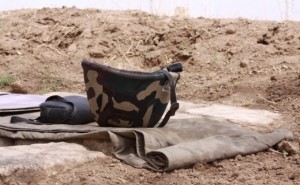Nagorno-Karabakh Ceasefire 2.0?

An October 9 Russia-brokered ceasefire between Armenia and Azerbaijan in Nagorno-Karabakh (NK below) failed to take hold.
On Saturday, warring sides again agreed to halt fighting, effective Sunday, citing humanitarian reasons.
An Azeri Foreign Ministry statement said the following:
“The Republic of Azerbaijan and the Republic of Armenia have agreed to a humanitarian truce as of October 18th, 00h00 local time,” adding:
“This decision was taken following the statement of the presidents of the French Republic, the Russian Federation and the United States of America, representing the co-chair countries of the OSCE Minsk Group of 1 October 2020, the statement by the co-chairs of the OSCE Minsk Group of 5 October, and in line with Moscow statement of 10 October 2020.”
On Saturday, Russian Foreign Minister Sergey Lavrov held talks with his Armenian and Azeri counterparts by phone.
NK’s Foreign Ministry agreed to halt fighting.
It’s unclear if ceasefire will hold this time, not so far on Sunday.
Straightaway after it became effective, Armenia accused Azerbaijan of breaching it.
Armenia’s Defense Ministry spokeswoman Shusan Stepanyan said Azeri shelling and rocket fire continued early on Sunday, adding:
Pre-dawn, Azeri forces “launched mortar and artillery fire in the vicinity of Jabrayil, as well as the liberated villages on the Aras River.”
“There are no casualties among the personnel. Our units have taken adequate response measures.”
Baku had no immediate response to the charge.
Along with Russia, France and the US were involved in brokering ceasefire in NK on Saturday.
They co-chair the so-called Minsk Group. An Elysee Palace statement said the following:
“France will pay great attention to that and will remain engaged for a lasting end to hostilities and a quick start of credible negotiations.”
Since Azerbaijan initiated fighting on September 27, hundreds on both sides were killed, many others wounded, along with widespread destruction in NK.
As in all conflicts, defenseless civilians are caught in the crossfire, their lives and well-being jeopardized.
On Saturday, an Armenian Foreign Ministry statement said the following:
“We highly appreciate the efforts of the OSCE Minsk Group co-chairs and the direct participation of the French President (Macron) in reaching an agreement on a ceasefire on humanitarian grounds on October 17.”
“We believe that this agreement implements the joint statement adopted in Moscow, which expresses the need to introduce ceasefire verification parameters.”
Separately, Stepanyan reported calm alone “the line of contact” early Sunday.
NK’s presidential spokesman Vagram Pogosyan issued a similar statement.
Sergey Lavrov urged both warring sides to stick to ceasefire terms — in conversations with his Armenian and Azeri counterparts on Saturday by phone, according to a Russian Foreign Ministry statement.
He also urged both sides to begin serious negotiations to resolve differences and restore a durable peace — that requires compromises by warring parties.
Ceasefire terms call for exchange of prisoners and to allow for humanitarian aid to reach conflict areas.
What Russia proposed on October 9 remains in effect.
It calls for a gradual “(t)roop withdrawal from five districts at the first stage is to be complemented with the restoration of communications, economic ties and transport contacts, as well as the deployment of peacekeeping forces to guarantee the non-resumption of hostilities,” Lavrov explained.
Military observers rather than peacekeepers would be involved.
As a neutral party with good relations with both warring sides, Lavrov offered to provide them if their leadership agrees.
Turkish ties to Azerbaijan, training of their military forces, large-scale sales of Turkish heavy weapons to Baku, Ankara’s command and control involvement in fighting, along with supplying jihadist fighters against Armenia greatly fueled weeks of conflict.
In talks with his Turkish counterpart Mevlut Cavusoglu, Lavrov failed to convince him that diplomacy alone can resolve fighting, he said, adding:
“We do not agree with the position that has been voiced by Turkey and enunciated on several occasions by President Ilham Aliyev of Azerbaijan.”
“It is no secret. We cannot share statements to the effect that there is a military solution to the conflict and that it is acceptable.”
“Regrettably, Turkey has been able to do this, confirming that it will support any actions undertaken by Azerbaijan to solve this conflict, including military ones.”
Iran borders Armenia and Azerbaijan. On Saturday, Iranian Foreign Minister Zarif discussed the situation in NK with his Azeri counterpart Jeyhun Bayramov.
According to Iran’s Foreign Ministry, he offered to help restore calm to NK and work toward achieving a durable peace — cooperatively with Minsk Group co-chair countries.
On Thursday, Iran’s Foreign Ministry spokesman Saeed Khatibzadeh expressed concern about rockets striking along its border areas, adding:
“Unfortunately, worrying reports have been received today in this regard, and that is not at all acceptable.”
Reportedly last week, missiles or rockets struck two Iranian villages, damage and at least one injury reported.
Khatibzadeh stressed that “(t)he security of our citizens living in border regions is the red line of our armed forces.”
Iran cannot “remain indifferent” to cross-border threats.
Clearly Tehran wants involvement in NK confined to helping both sides reach accommodation to halt fighting.
At the same time, its ruling authorities will act to protect the country’s security from foreign threats.
Major differences between warring parties are longstanding and deep-seated.
It’s unclear if ceasefire will hold this time or if conflict will continue.
*
Note to readers: please click the share buttons below. Forward this article to your email lists. Crosspost on your blog site, internet forums. etc.
Award-winning author Stephen Lendman lives in Chicago. He can be reached at [email protected]. He is a Research Associate of the Centre for Research on Globalization (CRG)
His new book as editor and contributor is titled “Flashpoint in Ukraine: US Drive for Hegemony Risks WW III.”
http://www.claritypress.com/LendmanIII.html
Visit his blog site at sjlendman.blogspot.com.

